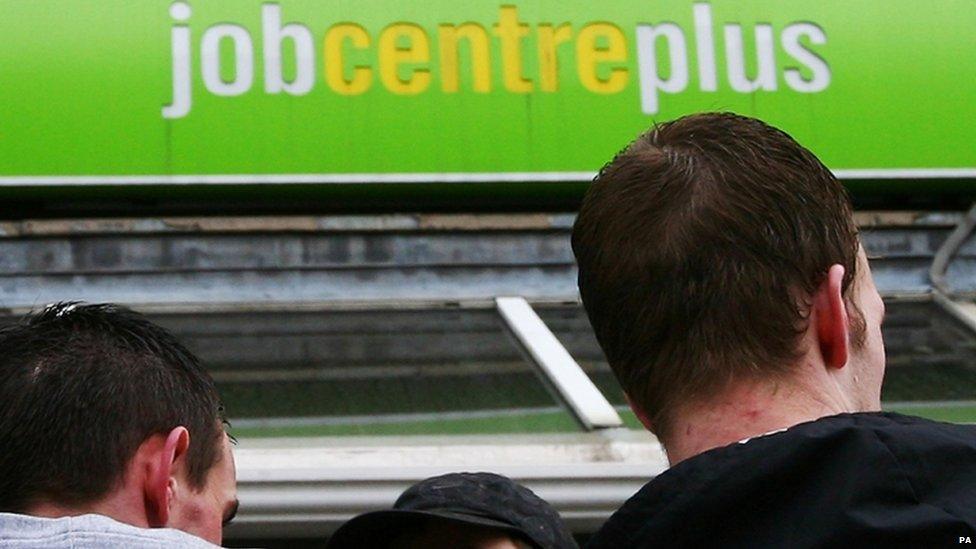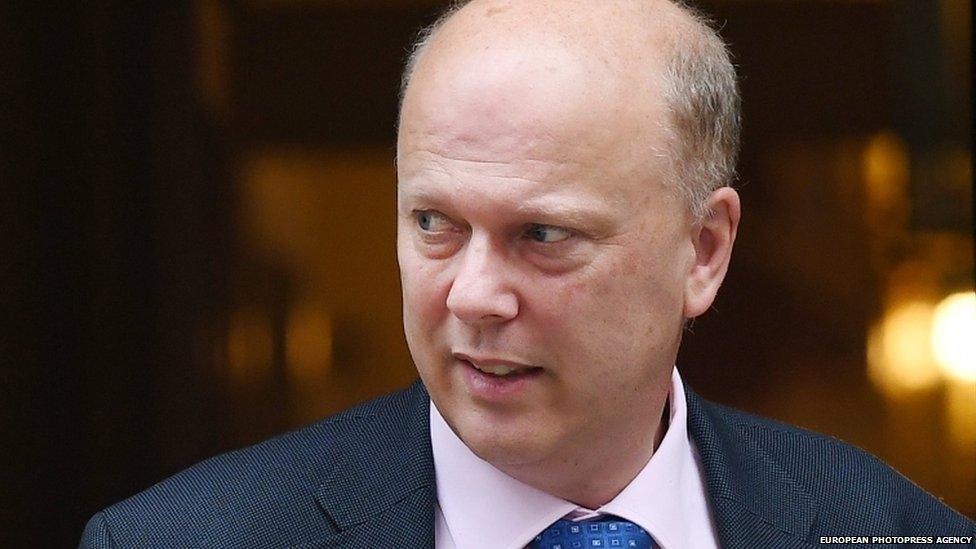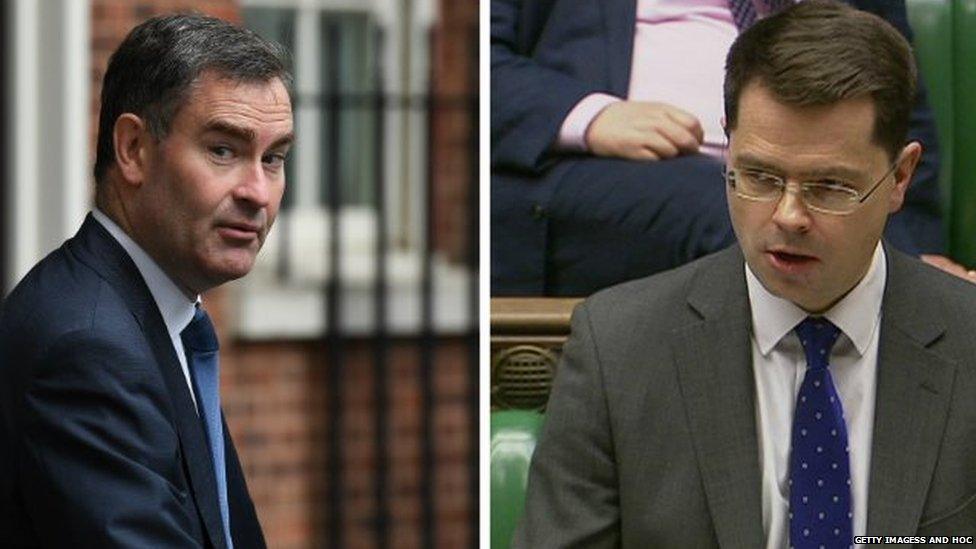Week ahead in Parliament
- Published

Could Labour's Opposition Day debate on Universal Credit see Tory MPs defy whips?
There's no Brexit Bill - so, instead, a mixture of Opposition and backbench debates fills the time in the Commons this week.
Barring the usual crop of ministerial statements and urgent questions, the only event which might set many sparks flying is Labour's Opposition day attack on the rollout of Universal Credit.
Labour seem to be choosing subjects that might peel away the Conservatives support from the Northern Ireland DUP contingent, and this debate could force them to reprise their controversial tactic of declining to vote, even though the motion will doubtless be carefully drawn to make it difficult for government MPs to sit on their hands.
One event offstage could sour the atmosphere; the publication of the latest proposals to reshape the boundaries of parliamentary constituencies and reduce their number.
Essentially a lot of MPs will find out whether the Boundary Commission, external has drafted their electoral death warrant. Although there is the thought that the order necessary to implement their boundary reviews and cull 50 MPs might not get through the current House of Commons - and even that a concession, like ordering a re-review based on keeping the current 650 seats could be deployed at a moment when the Tory troops are restive.
Something else to look out for will be the Public Accounts Committee's first report of this Parliament, on tackling online VAT fraud and error, on Wednesday morning; judging by the evidence sessions it could be strong stuff.
Here's my rundown of the week ahead.
Monday
The Commons opens (2.30pm) with Home Office questions - and the usual post-weekend urgent questions or ministerial statements can be expected at 3.30pm.
The main debate is the second reading of the Nuclear Safeguards Bill, external, which sets up a new system of safeguards against nuclear weapons proliferation, after the UK leaves the EU's nuclear cooperation agency Euratom, post-Brexit.
Given that a fair number of Conservative MPs, particularly in places like Oxfordshire, where there is a substantial nuclear industry, want to try and maintain UK membership of Euratom, expect some speeches on that issue.
The adjournment debate led by the Conservative, Steve Double, is on consumer protection for new house buyers and the National House Building Council. New home buyers mostly rely on the 10-year Buildmark warranty provided by the NHBC.
In Westminster Hall at 4.30 pm, MPs debate an e-petition calling for the abolition of the TV Licence fee - it attracted 125,958 signatures.

The transport secretary's committee grilling will include everything from HS2 to aviation
On the committee corridor, the Transport Secretary, Chris Grayling, is before his departmental committee with everything from the collapse of Monarch, the scrapping of rail electrification projects, HS2, Network Rail's budget and the implications of Brexit for aviation likely to be raised, in their first "getting to know you" session. New chair, Lilian Greenwood, once Labour's shadow transport minister, presides (4.45pm).
In the Lords (2.30 pm), questions to ministers range across recent appointments to the Equality and Human Rights Commission, the number of people currently in hospital waiting to be discharged to care homes, the effectiveness of slavery and human trafficking statements in reducing slavery in supply chains and devolution for Yorkshire
Then peers turn to the detail of the Space Industry Bill, external, in committee of the whole House. Key issues include range control, licences, individuals taking part in space flight, safety and security. The Lib Dems have some probing amendments down, to see what plans the government has made, if any, for Britain to play its full part in the European Space Agency and the impact it will have on Britain's capacity to participate in collaborative research and development and talent exchange with EU countries.
There will also be debate around safety and environmental concerns and the impact of Space Ports on local communities in terms of transport, emergency services and other essential services.
During the dinner break, the Lib Dem Lord Sharkey leads a short debate on the problems faced by the people of Northern Cyprus following the failure of the reunification talks. He warns that the consequences are continued isolation of the Turkish Cypriot North, continuation of economic embargoes, continued lack of investment in the north and inability of the people in the north to live in a modern economy. He will argue that Britain is intimately involved, because it retains two sovereign bases on the island.
Tuesday
MPs open (11.30am) with Foreign Office questions. Then Tory new boy Jack Brereton presents a ten-minute rule bill to relocate Channel 4 away from London - as a Stoke MP he will doubtless recommend his home city as a suitable destination.
And the main event is a backbench debate on the persecution of the Rohingya by the Myanmar government - Labour's Rushanara Ali and the Conservative Anne Main will propose a motion that the Commons agrees with the statement by the UN High Commissioner for Human Rights, that the treatment of the Rohingya by the Myanmar government amounts to a textbook case of ethnic cleansing.
In Westminster Hall (11am) the Conservative Richard Benyon has a debate on the threat to the lowland curlew - seven of the world's 13 curlew and godwit species face extinction, and Mr Benyon warns that "this magical bird will soon be extinct in lowland Britain unless action is taken".
Other debates include supporting and safeguarding adults with learning disabilities (2.30pm); sentencing in cases of dangerous driving involving death (4pm): and the use of devolved powers in Scotland (4.30pm).
My committee pick is the Home Affairs Committee evidence session with the Home Secretary Amber Rudd (2.30 pm), which will range across such subjects as counter-terrorism, police resources, delivery of post-Brexit immigration services and unaccompanied child migrants.
In the Lords (2.30 pm) question time covers home ownership and the Definition of Islamophobia
The main debates are on a series of select committee reports starting with the Communications Committee's A privatised future for Channel 4?, external which warns against selling it off, saying: "that some of the important content that C4C produces in news, current affairs and film would be at risk if the organisation was privatised and had to operate in a more commercially focussed environment.
"C4C's roles in commissioning programmes from smaller production companies and from outside London would both be threatened by a privatisation deal. We are concerned that, notwithstanding assurances given at the point of sale, a private owner may seek to dilute C4C's public service remit in future, in order to maximise profit. We draw attention to the risk involved in a sale: once a company has passed into private ownership—particularly, as is likely, with a C4C sale, into overseas' ownership—there is no mechanism to control or influence its fate."
Then, there are debates on two related European Union Committee reports, on Brexit: agriculture, external (which warns that the government's vision for the UK as a leading free-trade nation with low tariff barriers to the outside world does not sit easily with its declared commitment to high quality and welfare standards in the UK farming sector) and Brexit: farm animal welfare, external (which raised fears of increased imports from countries operating lower farm animal welfare standards, making UK producers uncompetitive. This could undermine British agriculture or lead a race to the bottom in animal welfare standards.)
Finally peers discuss a report from the Science and Technology Committee on Nuclear research and technology: Breaking the cycle of indecision, external.
This argues that the potential benefits of civil nuclear energy have been blighted by the indecision of successive governments, but that post-Brexit, it is now critical for the government to set out a decisive future for the industry.
Wednesday
The Commons begins (11.30 am) with half an hour of International Development questions followed, at noon, by Prime Minister's Questions.
The SNP's Chris Stephens will move his ten-minute rule bill, on workers' rights. This was prompted by a cancelled Green Day concert at Bellahouston Park, where, he says, hundreds of workers have been left out of pocket and lost a full day's pay at zero notice, and by instances of people being paid below the minimum wage. He believes some of these issues can be addressed by clarifying and reforming the law on employment status.
The day's main business is a Labour Opposition Day debate on a motion to "pause and fix the roll-out of Universal Credit".
This is a smart choice of subject, given that a number of Conservative MPs are anxious about the implementation of UC, and it will be interesting to see whether the government will instruct its MPs to vote against or press an amendment to the Labour motion, after the controversial tactic of not opposing an opposition motion on higher education funding, in September.
In Westminster Hall the first debate (9.30am-11am) is on the risk of surgical mesh implants, led by the Labour MP Emma Hardy. The implants are widely used to treat common conditions in women who have had children. During the past decade, more than 100,000 women in the UK have been fitted with the implants, but some have suffered serious complications. In July, the government released its three-year investigation into mesh implants, which concluded that the use of mesh was "a safe option for women".
Then, (11am-11.30am) Melanie Onn has a debate on social security support for carers who voluntarily look after younger relatives to stop them being taken into care, and fears they are being denied thousands of pounds in welfare entitlements as a result of the two-child benefit cap, despite government promises to exempt them.
The Conservative Derek Thomas raises the effect of taxes on small businesses (2.30pm-4pm). He has urged the Treasury to raise the VAT threshold by almost 50% in a bid to help small businesses in his constituency. And Labour's Chris Elmore leads a debate on women released from prison (4.30pm- 5.30pm).

Two more secretaries of state - David Gauke and James Brokenshire - will be facing select committees on Wednesday
My committee pick is the Work and Pensions hearing (9.30am) with secretary of state David Gauke on the rollout of Universal Credit - particularly charged in the light of the afternoon's Opposition Day debate.
The committee has sent him four letters posing detailed questions about the difficulties that have plagued UC, and the solutions the DWP is attempting to implement. Also at large on the committee corridor is Northern Ireland Secretary James Brokenshire, who will be quizzed on progress towards re-establishing the Northern Ireland Assembly, the status of negotiations on the future of the Irish border, and the wider impact of Brexit on the region (9.30am).
Also, there's the Procedure Committee hearing on the scrutiny of Brexit delegated legislation. This week's witnesses are the Leader of the Commons Andrea Leadsom, the SNP's Pete Wishart, and Brexit Minister Steve Baker (2.45 pm).
They will be focussing on one of the real sore spots in the EU (Withdrawal) Bill: the concern that the powers it grants to ministers are dangerously wide and would bypass proper parliamentary scrutiny. The session could turn into a public negotiation on a compromise mechanism to ensure that MPs keep across the exercise of those powers.
In the Lords (3pm) questions to ministers range across the product recall system and tumble driers, reforms to death certification and the creative industries and Brexit; before peers move to their second day of committee stage debate on the Space Industry Bill, external, where the focus will be on the sections dealing with liabilities, indemnities and insurance, and powers in relation to land.
The will also be a short debate, opened by Labour's Lord Dubs, on government plans for the future of hospitals in West London, particularly the proposals to sell off the site of Charing Cross hospital.
Thursday
The Commons opens (9.30 am) with Transport questions, which will be followed by the weekly Business Statement from the Leader of the House, Andrea Leadsom, setting out the Commons agenda for the following week and, possibly, beyond.
There is an increasing backlog of debates which have not materialised...including the committee stage of the EU (Withdrawal) Bill (see above) and the long awaited debate on whether MPs and peers should move out of the Victorian home of Parliament to make way for a multi-billion pound "Restoration and Renewal" project.
Then come two debates on subjects chosen by the Backbench Business Committee. First Labour's Sir Kevin Baron will lead a debate on the Tobacco Control Plan. This has been in operation since 2010 and has been fairly successful in cutting smoking, but the UK still has 7.3 million smokers and he believes a new effort is needed, aimed particularly at teenagers. And he also wants to highlight funding cuts for stop smoking services.
The second debate is on Valproate and fetal anticonvulsant syndrome. Valproate is an effective epilepsy medication, but has side effects on children in the womb - leading to spina bifida, autism, lower IQ and other issues. Former health minister Norman Lamb compared the situation to the Thalidomide scandal in the 1960s.

The Space Industry Bill will be scrutinised in the Lords this week
In Westminster Hall, there are two more backbench debates - first a general debate on carbon capture and storage led by the Conservative, Simon Clarke. He believes this is a crucial environmental technology which could offer huge opportunities to British industry - which missed the boat on offshore wind power.
Then there's a debate on the government's review of defence capability led by the Conservative Marcus Fysh - this could provide a sounding board for rising backbench concern over the government's Defence Review, where possibilities like the scrapping of the Royal Marines and the selling-off of defence material have been aired.
In the Lords (11am) question time includes the Labour former cabinet minister Lord Hain asking about preventing money laundering through British banks by families and businesspeople linked to the government of South Africa, The day's main debates are on subjects chosen by backbench peers, starting with the Lib Dem Lord Greaves on District Council services in two-tier areas; then the Conservative Lord Black of Brentwood on commemorating the Battle of Passchendaele.
The day ends with a Labour regret motion against the National Health Service (Pharmaceutical and Local Pharmaceutical Services) (Amendment) Regulations 2017 - with Lord Hunt of Kings Heath highlighting the delay of the review of regulations governing community pharmaceutical services with pharmacies facing closure due to budget cuts.
Friday
The Commons meets (9.30am) to debate the first of the new crop of private members' bills - starting with the second reading of the Labour MP Chris Bryant's Assaults on Emergency Workers (Offences) Bill, external.
The word is that the Conservative MPs who often talk these bills out will not perform their usual blocking manoeuvres on this measure - which implies that the debate may close in time to give Kevin Hollinrake's Parental Bereavement (Leave and Pay) Bill, external a chance.
Also on the agenda are no less than 17 private members bills from the Conservative awkward squaddie Chris Chope, on subjects ranging from Public Sector Exit Payments (Limitation), external to Fruit and Vegetables (Classification) Bills, external. There won't be much time left for any of them, but a wily MP with a bill to get through would be wise to allow him ten minutes in the limelight....it is an investment in good will that could pay big dividends later on.
The Lords are not sitting.